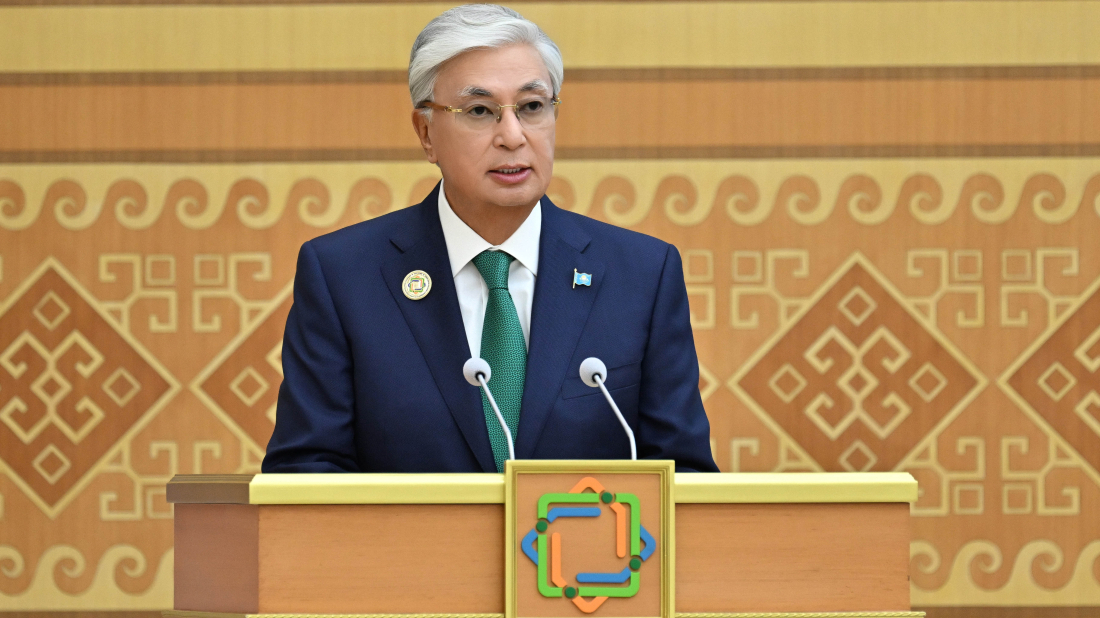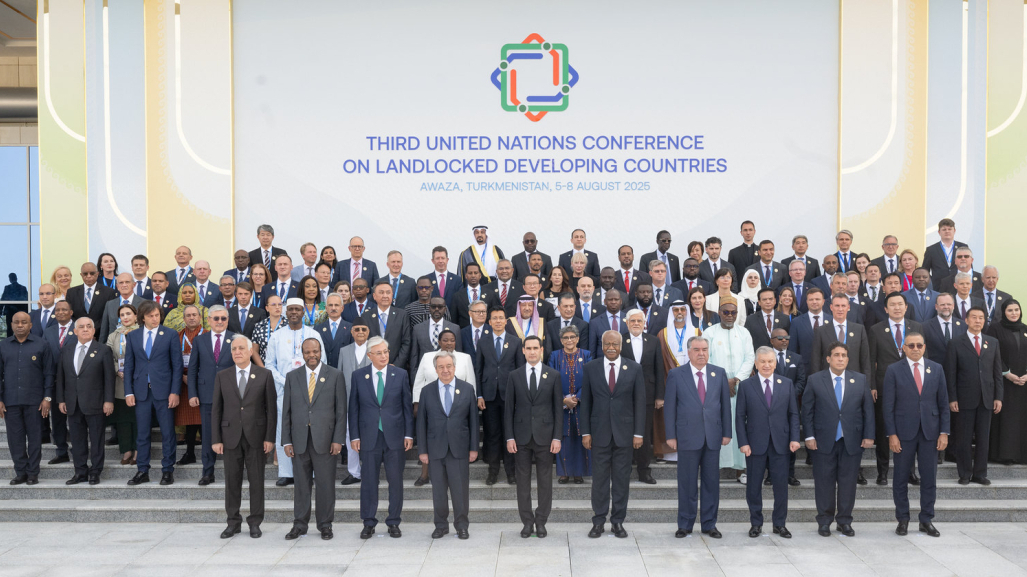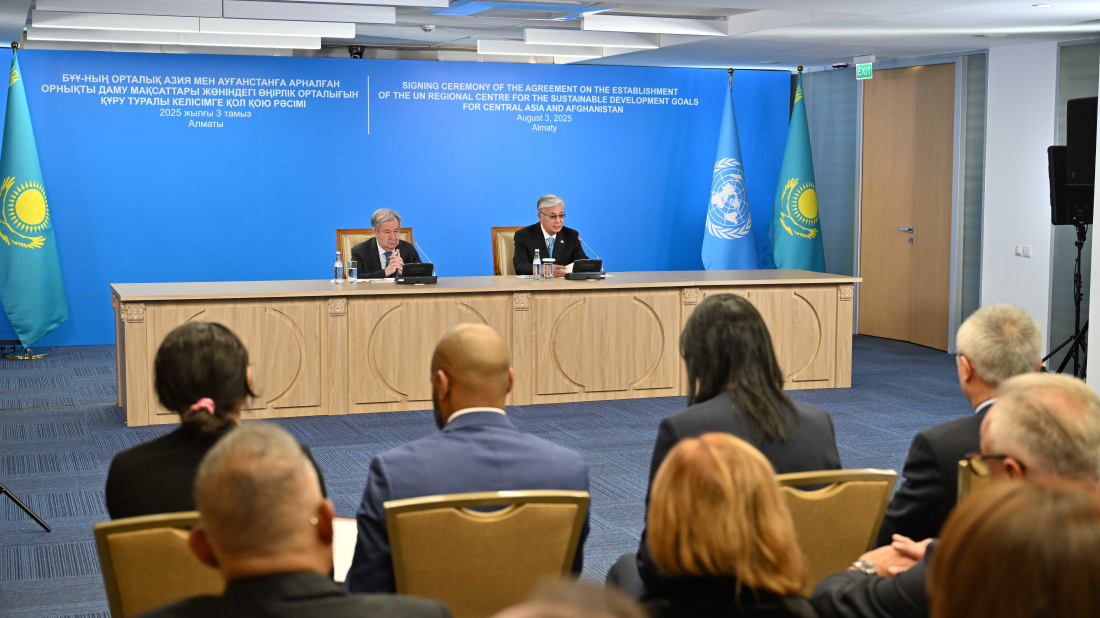Somali airstrike kills 15 al-Shabaab militants in Middle Shabelle
The Somali Army carried out a targeted airstrike in southern Somalia, killing 15 al-Shabaab militants, the country’s Defence Ministry said on Sunday...

President Kassym-Jomart Tokayev announced that Kazakhstan will host the Central Asian Regional Climate Summit in April 2026, in partnership with United Nations agencies. He also extended an invitation to participants of the Third UN Conference on Landlocked Developing Countries to attend the event.
Speaking at the UN Conference in Awaza, Turkmenistan, the President of Kazakhstan highlighted climate change as a key challenge to the sustainable development of landlocked developing countries ( LLDCs).
The UN conference underway in Turkmenistan is aiming to help transform LLDCs from landlocked to landlinked through smarter more climate resilient infrastructure, streamlined logistics, and stronger regional ties.

"Addressing these issues requires coordinated regional efforts and strong international support," President Tokayev stated. "At the same time, climate action must remain balanced and inclusive, aligning with the legitimate development needs of nations. To strengthen our collective efforts, I invite all of you to participate in the Regional Ecological Summit, to be held in Astana in partnership with the United Nations in April next year."
Over two decades ago, Kazakhstan took the lead by hosting the first-ever UN Conference on Landlocked Developing Countries, marking the beginning of its long-standing engagement in this important global effort. That historic event led to the adoption of the Almaty Programme of Action, which, for the first time, brought LLDC issues to the global development agenda.
“Today, we gather in Awaza with renewed determination and a shared commitment to advance this agenda further,” the Kazakh leader emphasized.
The main thematic roundtable was devoted to trade, which is a pressing issue for the world’s 32 LLDCs, which lack direct access to seaports. The average distance of LLDCs to a seaport is 1370 km. Kazakhstan is located farthest from the sea (3750 km) followed by Afghanistan, Chad, Niger, Zambia, and Zimbabwe with distances from the nearest sea coast in excess of 2,000 km.
President Kassym-Jomart Tokayev noted that Kazakhstan, along with its partners, is working to enhance regional connectivity, advance digital transformation, and promote long-term sustainable growth.
“We have prioritized the development of transport corridors and transit infrastructure, particularly along the North–South route and the Middle Corridor,” Kazakh leader stated. “Our long-term objective is to establish an integrated network of railways, roads, air routes, and logistics hubs. This will further strengthen Kazakhstan’s role as a Eurasian transit hub, which currently handles nearly 85% of all overland traffic between Asia and Europe. We are also making significant investments in digital connectivity.”
He highlighted that Central Asia’s experience proves geography does not determine destiny.
“With political will, strategic investment, and international cooperation, we are transitioning from a landlocked to a landlinked future,” Tokayev said. “Central Asia has become a hub of mutually beneficial interaction, marked by dynamic trade, investment, transport, communication, and sustainable resource management.”

On 3rd August, Kazakhstan and the United Nations signed the Host Country Agreement on the establishment of the UN Regional Centre for the Sustainable Development Goals for Central Asia and Afghanistan in Almaty.
Speaking at the signing ceremony, Tokayev stressed the need to “strengthen regional coordination and deepen United Nations engagement to tackle environmental challenges like the degradation of the Aral Sea and the shrinking of the Caspian Sea.”
António Guterres, in his remarks, stated that the opening of the centre represents the start of a new era of cooperation in Central Asian region in advancing the Sustainable Development Goals.
He added that the centre can become a vital pioneer in implementing the Programme of Action for Landlocked Developing Countries.
“Today, we can say that Kazakhstan is no longer a landlocked country. It is a key hub in the global trade system and a center for logistics, transportation, and telecommunications, with corridors spanning roads, railways, and fiber optics. Kazakhstan is truly a bridge connecting East and West, North and South,” stated António Guterres.
U.S. Ambassador to NATO Matthew Whitaker said China has the power to bring an end to Russia’s war in Ukraine, arguing that Beijing is enabling Moscow’s military campaign.
American figure skating star Ilia Malinin endured a dramatic collapse in the men’s free skate on Friday night, falling twice and tumbling out of medal contention at the Milan Cortina Winter Olympics as Kazakhstan’s Mikhail Shaidorov surged to a surprise gold medal.
“Respected and feared globally,” U.S. President Donald Trump told troops at Fort Bragg on Friday (13 February), framing America’s renewed strength against to mounting pressure on Iran amid stalled nuclear talks.
Speaking at Munich Security Conference, Ukrainian foreign minister Andrii Sybiha calls for decisive steps ahead of expected Geneva talks
Thousands of fans packed River Plate’s Monumental Stadium in Buenos Aires on Friday for the first of three sold-out concerts by Puerto Rican reggaeton star Bad Bunny, as part of his “Debí Tirar Más Fotos” World Tour.
Israel’s cabinet on Sunday approved measures aimed at expanding state oversight of land in the occupied West Bank and facilitating land purchases by settlers, a move Palestinian officials described as a 'de-facto annexation.'
U.S. President Donald Trump said on Sunday that member states of the newly formed Board of Peace will announce pledges exceeding $5 billion for Gaza’s reconstruction during a gathering in Washington this week.
Iran is pursuing a nuclear agreement with the U.S. that delivers economic benefits for both sides, an Iranian diplomat was reported as saying on Sunday (15 February), days before a second round of talks between Tehran and Washington.
Azerbaijani President Ilham Aliyev and Serbian President Aleksandar Vučić reaffirmed their countries’ strategic partnership in Belgrade on Sunday (15 February), signing a series of cooperation agreements.
Italy will participate as an observer in the White House initiative of 'Board of Peace,' Prime Minister Giorgia Meloni confirmed on Sunday (15 February).
You can download the AnewZ application from Play Store and the App Store.

What is your opinion on this topic?
Leave the first comment